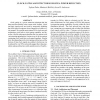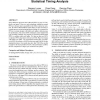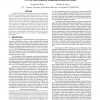118 search results - page 5 / 24 » A technique for minimizing power during FPGA placement |
FPL
2009
Springer
13 years 12 months ago
2009
Springer
Clock gating is a power reduction technique that has been used successfully in the custom ASIC domain. Clock and logic signal power are saved by temporarily disabling the clock si...
FPL
2004
Springer
14 years 22 days ago
2004
Springer
In order to enable efficient integration of FPGAs into cost effective and reliable high-performance systems as well potentially into low power mobile systems, their power efficienc...
FPGA
2010
ACM
14 years 4 months ago
2010
ACM
Deep submicron processes have allowed FPGAs to grow in complexity and speed. However, such technology scaling has caused FPGAs to become more susceptible to the effects of process...
FPL
2007
Springer
14 years 1 months ago
2007
Springer
The programmable clock networks in FPGAs have a significant impact on overall power, area, and delay. Not only does the clock network itself dissipate a significant amount of powe...
DAC
1997
ACM
13 years 11 months ago
1997
ACM
An ATPG technique is proposed that reduces heat dissipation during testing of sequential circuits that have full-scan. The objective is to permit safe and inexpensive testing of l...



